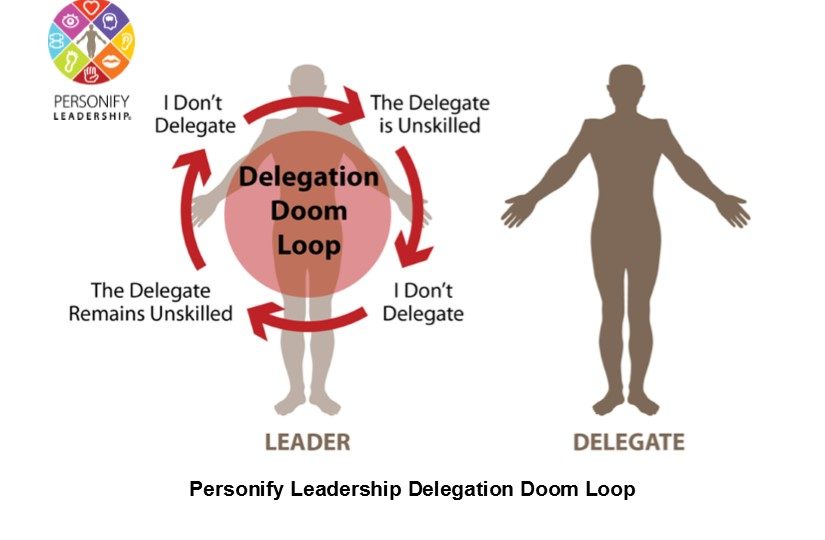The Courage to Delegate
- Nov 05, 2022
- By personifyadmin
- In Media, News, Newsletters
- 0 Comments
“If you are a leader who hasn’t assembled a team you can trust then you’re not a leader.”
Colin Powell on the Importance of Delegation
Mateo is a leader ready to move to the next level in his career. He had been very successful where he was for quite a long time. He knew how he was viewed in his division but his organization is global. He wanted to know how he was viewed by others who he had interacted with throughout the years outside of his immediate division. He asked me to assist him in learning more. Mateo gave me a list of key leaders that he would want to potentially work for in other parts of the company and he wanted to know how they viewed his leadership potential.
To start the process, I crafted several questions to better understand how they perceived leadership and how they perceived Mateo. The questions I used were as follows:
- What does it take to be a successful leader on your team/in your organization?
- From your experience or from what you’ve observed, what do you believe are the leadership strengths Mateo would likely bring to your team/organization?
- From your experience or from what you’ve observed, what do you believe are the areas Mateo would struggle or needs further development if moving to your team/organization?
- What additional insight or information do you have that would help Mateo continue to grow as a leader?
- On a scale of 1-5 with 1 being “no way” and 5 being “without question”, would you hire Mateo to lead in your organization?
Overwhelmingly the leaders I spoke with agreed that Mateo was a superstar. They knew he was capable of so much more than what he was doing and they all agreed it was about time for him to make a major career move. But when the feedback came back, Mateo was most interested in knowing what one key leader had said about “Would you hire Mateo to lead in your organization?” and that was Joseph. Joseph was a leader Mateo worked with often and respected more than anyone else. Joseph agreed with the others that he would hire him but not for a more senior role, Mateo would likely transfer Mateo to his department in a lateral position rather than a promotion. When I asked him to explain this more he said that he wasn’t sure Mateo delegated and developed his people to the level that he would want a more senior leader in his organization to do. As a matter of fact, I had known from interviewing Mateo’s team that this was true. On a scale of 1-5 how well does Mateo clearly and comfortably delegates both routine and important tasks and decisions his team rated him a 3 when all other competencies rated were at 4 and 5 consistently. I asked Joseph to tell me how he knew that Mateo struggled with delegating and developing his people. Joseph said, “Because whenever there is a problem and I need his team to solve that problem, I hear directly from Mateo and only Mateo. If he was leveraging his team more effectively he would be including them in high stakes problem solving and giving them outside exposure. He may be doing it with other groups but he doesn’t do it with mine.”
When I shared this information with Mateo, he was disappointed but he didn’t disagree. He said he knew he struggled with delegating to others. He said he felt like he could do it better than anyone else on his team. He feared that giving responsibility to others who could potentially fail put his reputation at high risk so he didn’t delegate instead he did it himself. And yet Mateo’s choice not to delegate became the reason he would not be considered for a promotion by one of his most respected leaders.
In Personify Leadership, we define delegation as sharing authority and responsibility with a delegate. We define the delegate as someone who is authorized to represent the leader. When you think about these definitions for most leaders there is an instant jab of pain right to the gut. Because giving others power, giving others control, and giving others a chance to do what we do so well is risky. Very risky. Who in their right mind wants to take a risk when they can quickly maintain the status quo by doing the job themselves and ensuring their reputation stays intact? Delegating to others requires a word we haven’t yet really tapped into, vulnerability.
Dr. Brené Brown is a research professor at the University of Houston Graduate College of Social Work and best-selling author. She has spent the past twelve years studying vulnerability, courage, worthiness. Dr. Brené Brown’s 2010 TEDx Houston talk, The Power of Vulnerability, is one of the top ten most viewed TED talks in the world. During an interview with Dan Schawbel in a Forbes article Dr. Brene Brown described the power of vulnerability this way, “When you shut down vulnerability, you shut down opportunity.”
These words could not be truer than when you apply them to delegation. For example, let’s look back to Mateo’s, he lacked the willingness to fail or have others fail. In other words he lacked the willingness to be vulnerable. The consequence of not being vulnerable was that he was unable to exercise an opportunity for growth and advancement. From my experience in working with leaders all over the world, this is true in general for leaders. It’s a small minority that learn to overcome what we at Personify Leadership refer to as the Delegation Doom Loop.
The Delegation Doom Loop looks something like this: I don’t delegate because the (potential) delegate is unskilled. Why is the delegate unskilled? Because I don’t delegate. I continue to not delegate to this person, and therefore, the team member remains unskilled. And round and round it goes. As a result, we continue to do the work ourselves, and the other individual never develops new skills. Here are some of the most common responses to why leaders don’t delegate.
Delegation takes too much time
I feel guilty giving my team more work
I like being the super star
I am afraid my people won’t do it as well as me
My customer only wants me
I don’t have the people to delegate to
A survey of 332 companies found that 46% of companies have a “somewhat high” or “high” level of concern about their workers’ delegation skills. Which means that just slightly less than one in two leaders commonly falls into the Delegation Doom Loop. Most of us don’t need a research study to tell us this, it’s a familiar experience that we know well. But the question on everyone’s mind is why? If we know that we are perpetuating a cycle that will not produce good results why do we continue to do it? The answer is simple, we lack the courage. It isn’t until we are overlooked for promotions or commonly, we find ourselves unable to scale our business to the size the market demands that we begin to realize that staying in our comfort zone is no longer an option. It’s hard, I get it. But is the alternative – stuck in the doom loop with limited opportunities- is it worth it to you? Do you want to end up a delegation statistic or do you want to do something different? What are you willing to do different today to break out of the doom loop?
~Personify Leadership






Recent Comments